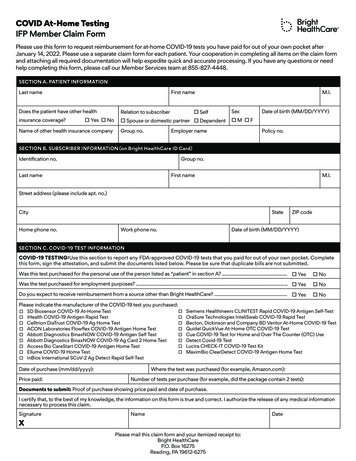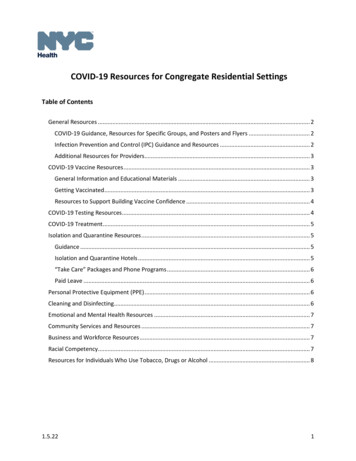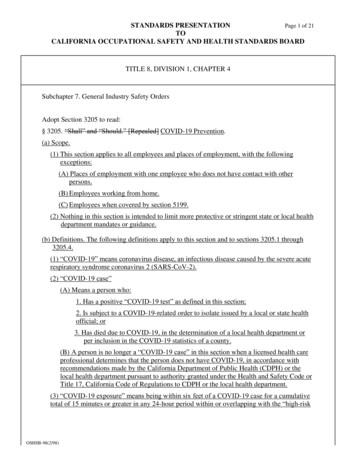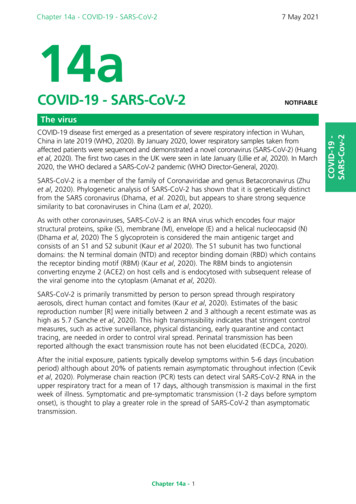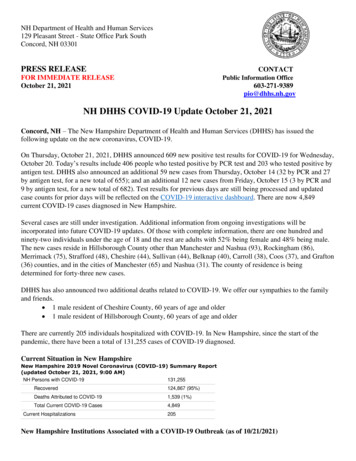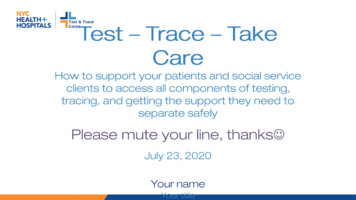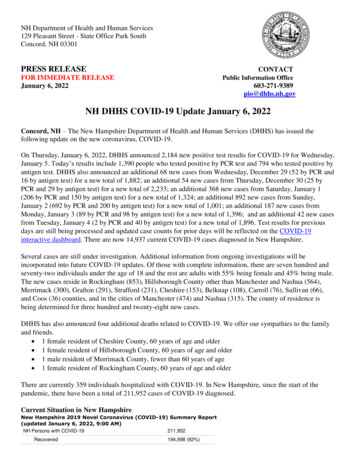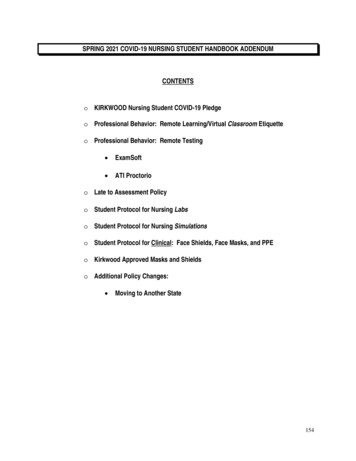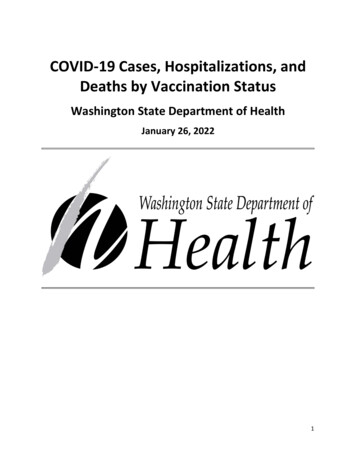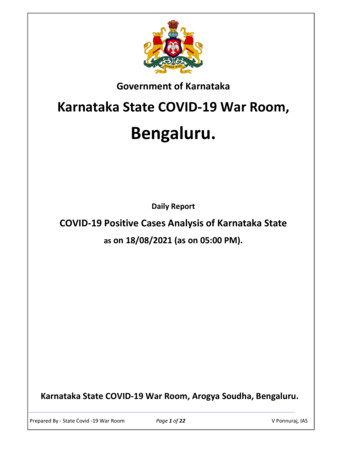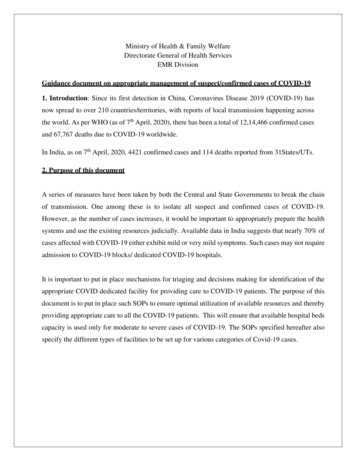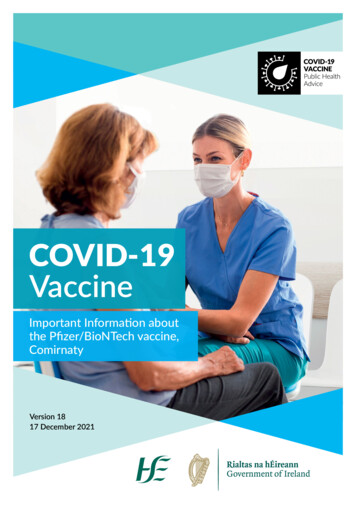
Transcription
COVID-19VaccineImportant Information aboutthe Pfizer/BioNTech vaccine,ComirnatyVersion 1817 December 2021
About this leafletThis leaflet tells you about the COVID-19 (coronavirus) vaccine.It tells you about: what COVID-19 is what the COVID-19 vaccine is who should get the vaccine why it is important to get the vaccine about COVID-19 vaccine booster doses who should not get it and who should delay getting it vaccine safety and side effects where you can get more informationPlease read this leaflet carefully. You can also talk to a healthcareprofessional, like your GP (Doctor) or Pharmacist, about the vaccine.2
What is COVID-19?COVID-19 is an illness that can affect your lungs and airways, andsometimes other parts of your body. It’s caused by a virus calledcoronavirus.It is highly infectious. It spreads through the air through dropletsproduced when people cough or sneeze, or when they touch surfaceswhere the droplets have landed and then touch their eyes, nose ormouth.COVID-19 can cause serious illness, hospitalisation and even death.The most common symptoms of COVID-19 are: a fever (high temperature of 38 degrees Celsius or above) including having chills dry cough fatigueYou may not have all of these symptoms or you may just feel generallyless well than usual. It can take up to 14 days for symptoms to show.They can be similar to symptoms of cold or flu.If you have any symptoms of COVID-19, self-isolate (stay in your room)and visit www.hse.ie/covid19 for advice.What is the COVID-19 vaccine?A vaccine is a substance that should improve immunity (protection) to aparticular disease. COVID-19 vaccines protect you from serious illnesswith COVID-19. If people are vaccinated, it should also reduce thenumbers who become seriously ill or even die from COVID-19 in ourcommunity.Vaccines teach your immune system how to protect you from diseases.It is much safer for your immune system to learn how to protect youthrough vaccination than by getting COVID-19.3
Who should get the vaccine?Find out who can get a COVID-19 vaccine atwww.hse.ie/covid19vaccineWhile it is up to you to decide to get the vaccine, the HSE, the WorldHealth Organization and the Department of Health strongly recommendthat you do so as soon as it is offered to you.You will need to read this leaflet and the manufacturer’sPatient Information Leaflet before you get your vaccine. Youcan find the manufacturer’s Patient Information Leaflet onwww.hse.ie/covid19vaccinePILYou can also talk to a healthcare professional in advance. If you decide toget the vaccine, you will give your consent which will be recorded.The HSE is offering the vaccine free of charge.How many doses of the COVID-19 vaccine do I need?You need 2 doses of this vaccine, 21 to 28 days apart, for protectionfrom serious illness.If you have a weak immune system you may need an additional dose ofCOVID-19 vaccine, at least 2 months after your second dose.Everyone aged 16 and over is recommended a booster dose.Why would I need a booster dose of vaccine?You should get a booster dose when it’s offered to you because theprotection you get from your initial course of vaccination may weakenwith time. Some people are at high risk of severe infection, for exampleolder people and people with underlying health conditions.We hope that a booster dose will give you better protection againstCOVID-19.4
When should I get a booster dose?You should get a booster dose at least 3 months after finishing a courseof COVID-19 vaccines. Some people might get a booster dose at least 2months after finishing the course.Why is it important to get the COVID-19 vaccine?Getting a COVID-19 vaccine should reduce your risk of gettingCOVID-19 and protect you from serious complications of the illness. Ouraim in offering the vaccine to the population is to protect people andreduce the illness and deaths caused by this virus.I already had COVID-19, so do I need to get the vaccine?Yes. Even if you have already had COVID-19, you could still get it again.The vaccine will reduce your risk of getting COVID-19 again. Even if youdo get COVID-19 again, the vaccine can reduce the seriousness of yoursymptoms.I have COVID-19 now, should I get the vaccine?No. You should delay getting vaccinated until you recover fromCOVID-19.Do this for: at least 4 weeks after you first notice symptoms or 4 weeks since you tested positive for COVID-19Can I get a booster dose after having COVID-19?If you have had COVID-19 since you were vaccinated, wait for 6 monthsbefore you get a booster dose or an additional dose.Can I get this vaccine at the same time as other vaccines?Yes, you can get a COVID-19 vaccine at the same time as any othervaccines that you need.5
What are the recommendations on boosters and additionaldoses?The European Medicines Agency (EMA) license vaccines in Europe.The National Immunisation Advisory Committee (NIAC) makesrecommendations for Ireland based on local data and evidence.EMA and NIAC advice may vary at times. Where EMA advice differs fromNIAC, we follow NIAC guidance in Ireland.For people aged 12 and over who are immunocompromised, the EMAhas approved an additional dose of the same mRNA vaccine you alreadyhad, 28 days after the second dose. NIAC advise that any mRNA vaccinecan be given, regardless of which vaccine you have received, at least 2months after the last COVID-19 vaccine.For anyone over 18, EMA has approved a booster dose of the samemRNA vaccine you already had 6 months after the second dose. NIAChas recommended that anyone over 16 can have any mRNA vaccine,regardless of which vaccine you had, at least 3 months after your lastvaccine dose.Getting the vaccineWho is my vaccinator?Your vaccinator is the person who gives you your vaccine. They aretrained by the HSE to give COVID-19 vaccines.Can the COVID-19 vaccine give you COVID-19?No. The COVID-19 vaccine cannot give you COVID-19. It is possible tohave caught COVID-19 before getting your vaccine and not realise youhave the symptoms until after your vaccination appointment.If you have any symptoms of COVID-19, or if you have a fever whichstarts more than 2 days after your vaccine, or lasts longer than 2 days,self-isolate (stay in your room) and visit www.hse.ie/covid19 for advice.6
Should I get the COVID-19 vaccine if I have a hightemperature?No. You should delay getting the vaccine if you have a fever (temperatureof 38 degrees Celsius or above), until you feel better.Should I get the vaccine if pregnant, trying to get pregnantor breastfeeding?You should get a COVID-19 vaccine to protect yourself from the virus ifyou’re: pregnant trying for a baby or might get pregnant in the future breastfeedingMost pregnant women who get the virus get mild to moderatesymptoms. They give birth as planned and the risk of passing onCOVID-19 to their baby is low.However, you are more likely to get very unwell and need treatment inintensive care than a woman who is not pregnant. The virus may alsocause complications for your baby.If you’re pregnant, you should get a booster dose when it’s offered to you.COVID-19 vaccines are still new and we’re still learning about them. Youcan read more at www.hse.ie/covid19vaccineWhat vaccine am I being offered?The vaccine we are offering you is called Comirnaty, manufactured byPfizer/BioNTech. This mRNA vaccine teaches your body how to make aprotein that will trigger an immune response, without using the live virusthat causes COVID-19.Your body then makes antibodies that help fight the infection if theCOVID-19 virus enters your body in the future.You can have this vaccine as a booster dose, even if you already got adifferent vaccine.This leaflet has important information about the vaccine you are beingoffered. Please read it. You can also find it on www.hse.ie/covid19vaccine7
Is the vaccine safe?The HSE only uses vaccines when they meet the required standards ofsafety and effectiveness.While the work to develop COVID-19 vaccines has moved much fasterthan usual, the vaccine we are offering you has gone through all the usualsteps needed to develop and approve a safe and effective vaccine.In order to be approved for use, the COVID-19 vaccine went throughall the clinical trials and safety checks all other licensed medicines gothrough, following international standards of safety.The vaccine we are offering you is called Comirnaty, manufactured byPfizer/BioNTech. It has: been tested with thousands of people as part of clinical trials met strict standards of safety, quality and effectiveness, andbeen approved and licensed by regulators. For Ireland, theregulator is the European Medicines Agency (EMA) – visitwww.ema.europa.eu for more informationIs a booster dose safe?Studies on people who got a booster dose haven’t shown any seriousside effects but we have less information on the safety of the boosterand additional doses. A number of countries are giving boosters andadditional doses.8
How is the COVID-19 vaccine given?The COVID-19 vaccine is given as an injection into your upper arm. It willonly take a few minutes.What are the side effects of the vaccine?Like all medicines, vaccines can cause side effects. Most of these are mildto moderate, short-term, and not everyone gets them.More than 1 in 10 people may experience: feeling tired tenderness or swelling in your arm where you have had the vaccine injectionheadachemuscle painjoint paindiarrhoeafever (temperature of 38 degrees Celsius or above)More than 1 in 100 people may develop nausea, vomiting or rednesswhere the vaccine was given.More than 1 in 1,000 people will develop itchiness where the vaccinewas given, generalised itchiness, a rash, swelling of the lymph glands,sleeplessness, excessive sweating, night sweats, decreased appetite, lackof energy or lethargy.Bell’s palsy is a rare side effect seen in more than 1 in 10,000 people.Rarely, people who have had facial fillers may develop swelling of theirface. This is seen in more than 1 in 10,000 people.Serious side effects, like a severe allergic reaction, are extremely rare andare seen in approximately 1 in 100,000 people. Your vaccinator is trainedto treat very rare serious allergic reactions.Extremely rarely, people may develop Erythema Multiforme, a skinreaction that causes red spots or patches on the skin that may look like atarget or “bulls-eye” with a dark red centre surrounded by paler red rings.9
Very rarely, people may develop myocarditis and pericarditis aftergetting the Pfizer/BioNTech vaccine. Myocarditis and pericarditis areinflammatory heart conditions. The risk of these very rare conditions ishigher in younger men.These conditions are more likely to occur after the second dose andmostly happen within 14 days of getting the vaccine.Two European studies have estimated the risk of myocarditis, after thesecond dose of the vaccine as: one additional case for every 38,000 men aged 12 to 29(within 7 days). one additional case for every 17,500 men aged 16 to 24(within 28 days).The risk of myocarditis or other rare side effects after a booster dose isnot yet known.The COVID-19 vaccine has gone through the same clinical trials andsafety checks as all other licensed vaccines, however the vaccine is newand long-term side effect information is limited.As more people in Ireland and around the world get this vaccine, moreinformation on side effects may become available. The HSE will updatethis information regularly on our website, and if necessary, will updatethe information leaflets given to people at their vaccination.Fever after the vaccineIt’s quite common to develop a fever after a vaccination. Usually, thishappens within 2 days (48 hours) of getting the vaccine, and it goes awaywithin 2 days.You are more likely to get a fever after your second dose of the vaccine.If you feel uncomfortable, take paracetamol or ibuprofen as directed onthe box or leaflet. If you are concerned, please seek medical advice.10
Symptoms of myocarditis and pericarditisMyocarditis and pericarditis are conditions that cause inflammation of theheart. Even though the risk of these conditions is very low, you shouldknow the signs to look out for. Get medical help if you get any of thesesymptoms after your Pfizer/BioNTech vaccine: breathlessness palpitations (a forceful heartbeat that may be irregular) chest painAre there some people who should not get the COVID-19vaccine?Yes. You should not get the Pfizer/BioNTech COVID-19 vaccine if: you have had a severe allergic reaction to any of the ingredientsin the vaccine (including polyethylene glycol or PEG). Read themanufacturer’s Patient Information Leaflet to see the list ofingredients. you have had a severe allergic reaction to a previous dose of thevaccine or the Moderna (Spikevax) COVID-19 vaccine. you have been told by a doctor that you should not have theModerna (Spikevax) COVID-19 vaccine or the Pfizer/BioNTechCOVID-19 vaccine. you had myocarditis after a previous dose of this vaccine or theModerna (SpikeVax) COVID-19 vaccine.Talk to your Doctor before getting the COVID-19 vaccine if you: have had an severe allergic reaction (anaphylaxis) in the past,including to any other vaccine or medication. had pericarditis after a previous dose of this vaccine or theModerna (SpikeVax) COVID-19 vaccine.Most people will be able to safely get the vaccine. The person givingyou the vaccine will be happy to answer any questions you have at yourappointment for the vaccine.They will also give you an aftercare advice leaflet, and a vaccine record cardshowing the name and batch number of the vaccine you have been given.11
How long does it take the vaccine to work?After having both doses of the COVID-19 vaccine, most people will haveimmunity. This means they will be protected against serious illness withCOVID-19.It takes 7 days after getting the second dose for it to work.There is a chance you might still get COVID-19, even if you have thevaccine.Does the vaccine work in everyone?Worldwide, vaccines save at least 2 to 3 million lives each year, andprotect many more from lifelong illnesses. Billions of people have nowreceived COVID-19 vaccines all over the world.There’s strong, reliable evidence that COVID-19 vaccines greatly reduceyour risk of getting COVID-19. They’re highly effective at preventingdeaths and serious illness with COVID-19.If you have a weakened immune system, there is no extra risk in takingthe vaccine but it may not work as well for you and you may needan additional dose of the COVID-19 vaccine for the best possibleprotection.When I get the vaccine, does that mean I won’t spreadCOVID-19 to others?We do not know yet if having the vaccine stops you spreading theCOVID-19 virus to others. You should continue to follow public healthadvice on how to stop the spread of the virus.In particular, you still need to: wear a face covering where advised wash your hands regularly stay at home if you have any symptoms of COVID-19Thank you for protecting yourself and others.12
How long does immunity last from the vaccine?Boosters are recommended to extend the protection of COVID-19vaccines. We do not know yet how long immunity will last after boosters.Clinical trials are ongoing to find this out.More informationFor more information, read the manufacturer’s Patient InformationLeaflet. This will be printed for you on the day you get your vaccine, oryou can find it on www.hse.ie/covid19vaccinePILYou can also talk to a health professional, like your GP (Doctor),Pharmacist or healthcare team.You can also visit the HSE website at www.hse.ie/covid19vaccine or callHSELive on 1800 700 700For more information on the COVID-19 vaccine, includingmaterials in other formats and translation support, visitwww.hse.ie/covid19vaccinematerialsHow do I report side effects?As with all vaccines, you can report suspected side effects to the HealthProducts Regulatory Authority (HPRA).The HPRA is the regulatory authority in the Republic of Ireland formedicines, medical devices and other health products. As part of itsrole in the safety monitoring of medicines, the HPRA operates a systemthrough which healthcare professionals or members of the public canreport any suspected adverse reactions (side effects) associated withmedicines and vaccines which have occurred in Ireland.The HPRA strongly encourages reporting of suspected adverse reactions(side effects) associated with COVID-19 vaccines to support continuousmonitoring of their safe and effective use. To report a suspected adversereaction to the COVID-19 vaccine, please visit www.hpra.ie/reportYou can also ask your Doctor or a family member to report this foryou. As much information as is known should be provided, and wherepossible, the vaccine batch number should be included.13
The HPRA cannot provide clinical advice on individual cases. Membersof the public should contact their healthcare professional (their Doctor orPharmacist) with any medical concerns they may have.Your personal informationIn order to administer the vaccine safely and to record all the necessaryinformation to monitor and manage the vaccine, the HSE will beprocessing your personal information. All information processed bythe HSE will be in accordance to the general laws and in particular theGeneral Data Protection Regulation (GDPR) which came into force in2018.The processing of your data will be lawful and fair. It will only beprocessed for the specific purpose to manage the vaccinations. Theprinciple of Data Minimisation has been applied. This means that onlydata that is necessary to identify you, book your appointment, recordyour vaccination and monitor its effects is being recorded.You have the following rights as a data subject under the GDPR inrespect of your personal data that are processed. Request information on and access to your personal data(commonly known as a ‘data subject access request’). This enablesyou to receive a copy of the personal data we hold about you andto check that we are lawfully processing it. Request correction of the personal data that we hold about you.This enables you to have any incomplete or inaccurate informationwe hold about you corrected. Request erasure of your personal data. This enables you to ask usto delete or remove personal data where there is no good reasonfor us continuing to process it. You also have the right to ask usto delete or remove your personal information where you haveexercised your right to object to processing. Object to processing of your personal data.More information is available at www.hse.ie/eng/gdpr14
Published by the HSEon 17 December 2021For the most up-to-dateinformation visit www.hse.ie
2 About this leaflet This leaflet tells you about the COVID-19 (coronavirus) vaccine. It tells you about: what COVID-19 is what the COVID-19 vaccine is who should get the vaccine why it is important to get the vaccine about COVID-19 vaccine booster doses who should not get it and who should delay getting it vaccine safety and side effects
